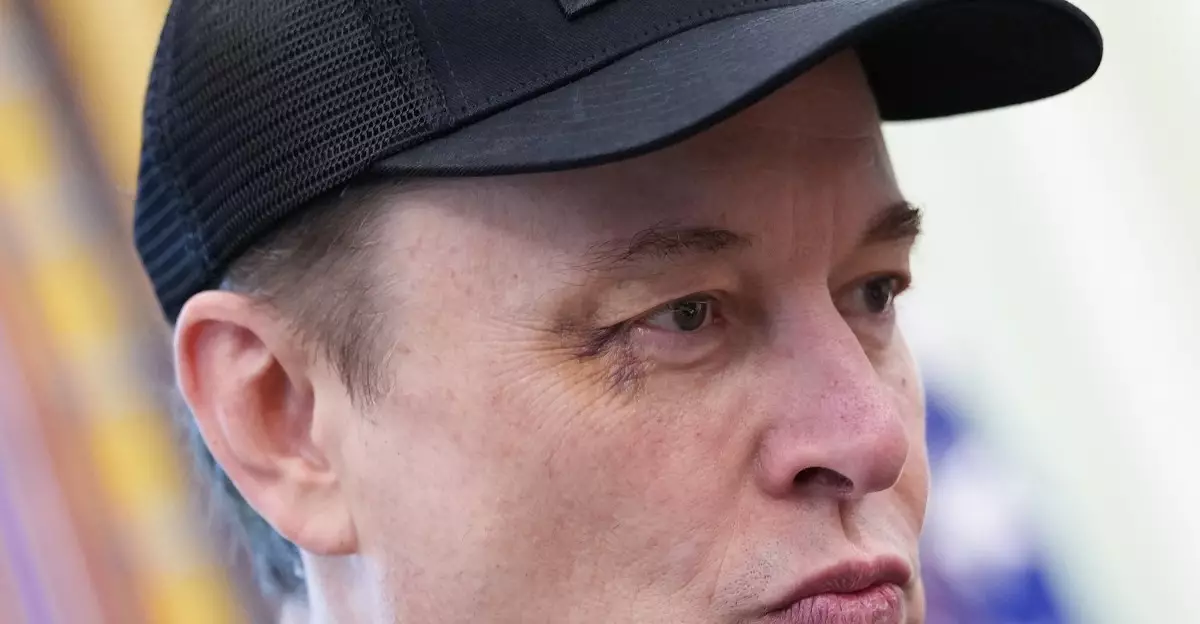Elon Musk, despite the spotlight that often follows him, has become a controversial figure navigating a political landscape fraught with challenges and cynicism. His recent tenure as head of the Department of Government Efficiency (DOGE) has been marred with scrutiny and suspicion. In an unusual press conference alongside former President Donald Trump, Musk sported a black eye, a physical reminder of the trials faced—both personally and professionally. This was not merely a case of physical bumps and bruises; it represented the backlash Musk has encountered following a turbulent five-month stint that raised eyebrows and for which outcomes remain questionable.
Musk’s claims of slashing waste and fraud from government budgets, boasting of a staggering trillion-dollar savings goal, have drawn skepticism. Research linking cuts in humanitarian assistance to tragic outcomes, particularly the distressing statistic of 300,000 deaths, casts a long shadow over his alleged efficiencies. It can be argued that this isn’t just another layer of controversy for Musk; it underlines a pattern in which his actions may not yield the utopian efficiency he forecasts, reflecting a growing disconnect between his corporate bravado and actual outcomes.
The Dichotomy of Public Perception
The public’s reaction to Musk’s leadership has shifted dramatically. Once celebrated as an innovator and disruptor, the billionaire’s recent actions have resulted in widespread discontent among Americans. Polls indicating that a significant majority of U.S. residents now hold negative opinions of him suggest an alarming trend. The duality of Musk’s public persona—an ambitious entrepreneur purportedly saving the government while grappling with plummeting Tesla sales—paints a disconcerting picture of a leader out of touch with public sentiment. His admission of exhaustion and frustration shines through in his demeanor, hinting at an individual worn down by the weight of his responsibilities and the criticism that accompanies them.
Tesla, once a paragon of modern success, finds itself in a precarious situation: a decrease in market share and its first reported decline in quarterly sales in nearly five years. This downturn not only reinforces a narrative of decline but raises questions about Musk’s ability to steer his flagship company through turbulent waters. As reports emerge indicating that Tesla’s board has begun searching for a new CEO, opinions suggest a tumultuous transition looms on the horizon. The notion that Musk, a figure synonymous with transformative technological advances, might relinquish control prompts both intrigue and concern within the Tesla community.
Musk’s Departure and the Legacy of DOGE
Despite departing DOGE, Musk’s insistence that the initiative will endure is a testament to his knack for self-promotion. Clad in a t-shirt adorning the title “The Dogefather”, his rhetoric positions himself not as a fallen star but as a torchbearer for change. Stating that “this is not the end of DOGE, but really the beginning,” Musk likens its mission to Buddhism—a philosophy of perseverance and continual growth. However, one must question the feasibility of this optimism amidst a backdrop of disillusionment and real-world implications of his leadership style.
While Musk claims DOGE has cut $160 billion, experts challenge the legitimacy of such assertions, positing that the actual savings might be substantially lower. This discrepancy speaks to a larger issue: the effectiveness of policy-driven initiatives spearheaded by a figure known for his alternative methods of communication and management. Moreover, reports suggest that DOGE’s operational decisions—marked by mass layoffs and inefficiencies—may have paradoxically cost the government billions, raising the question of whether any net positive can be attributed to Musk’s leadership.
The Future of DOGE: A Mixed Bag of Opportunity and Skepticism
With Musk’s departure, the future of DOGE teeters on the edge of uncertainty. Can the organization truly thrive without its polarizing leader, who has undeniably drawn attention—if not credibility—to its mission? The very fabric of DOGE is now stitched with complexities, with questions surrounding its sustainability and ethical implications of its reorganization underscoring its trajectory.
Much like the man at its helm, DOGE’s path is rife with contradictions and challenges, showcasing a landscape where ambition battles reality. Will it evolve into a proactive force for efficiency, or will it fade into obscurity, remembered merely as a chapter in Musk’s convoluted career? The answers lie ahead, marked by the actions of those who follow him and their resolve to redefine the future of government efficiency amidst a skeptical populace.

